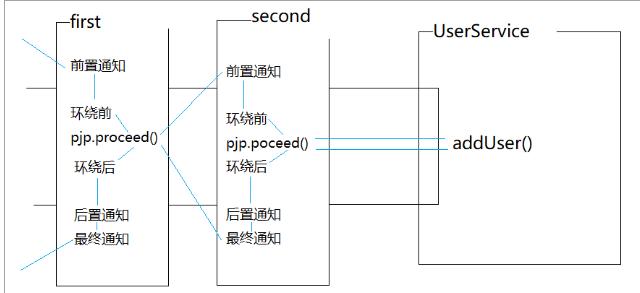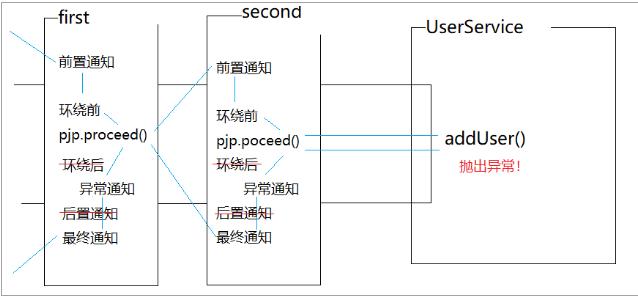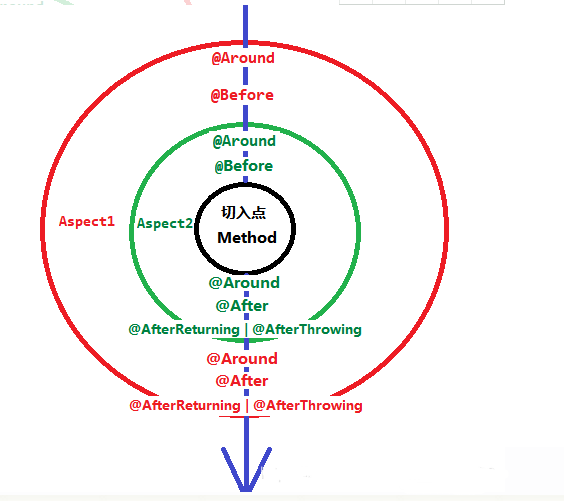多切面执行时,采用了责任链设计模式。
切面的配置顺序决定了切面的执行顺序,切面执行的过程,有几种方法调用的过程,在环绕通知的proceed()执行时间,去执行下一个切面或如果没有方法下一个切面执行目标,从而实现了如下的执行过程:(目标方法执行一次)
执行的顺序和配置顺序等有关
目标方法执行前:可以
后,环绕前(顺序)目标执行后:最终,环绕后,最终(可以改变)
链设计责任:为拉尔请求的和接收者之间的这个发送请求,而使许多对象有机会处理请求。有对象处理它
因为责任链设计模式第一次切面中调用破方法后,继续切面中的环绕前调用方法-----此时没有切面了---责任链去调用方法链去调用addUser()---调用结束addUser(),在执行环绕第二环绕方法后。。。。。

扫VX 领Java资料,前端,测试,python等等资料都有

如果目标方法抛出异常

通知间的跳转顺序

一些切入点责任链模式如下图
Aspect1和Aspect2两个切面类中所有通知类型的执行顺序,方法具体的切入点,顺序代表优先级,它根据一个int值来判断优先级的低,数字越小,是优先级的!所以,不同的切面,实际上是环绕于切入点的同心圆

jdk代理的源码为(这里采用默认的jdk代理模式获取代理,cglib原理类似):
/*
* Copyright 2002-2018 the original author or authors.
*
* Licensed under the Apache License, Version 2.0 (the "License");
* you may not use this file except in compliance with the License.
* You may obtain a copy of the License at
*
* http://www.apache.org/licenses/LICENSE-2.0
*
* Unless required by applicable law or agreed to in writing, software
* distributed under the License is distributed on an "AS IS" BASIS,
* WITHOUT WARRANTIES OR CONDITIONS OF ANY KIND, either express or implied.
* See the License for the specific language governing permissions and
* limitations under the License.
*/
package org.springframework.aop.framework;
import java.io.Serializable;
import java.lang.reflect.InvocationHandler;
import java.lang.reflect.Method;
import java.lang.reflect.Proxy;
import java.util.List;
import org.aopalliance.intercept.MethodInvocation;
import org.apache.commons.logging.Log;
import org.apache.commons.logging.LogFactory;
import org.springframework.aop.AopInvocationException;
import org.springframework.aop.RawTargetAccess;
import org.springframework.aop.TargetSource;
import org.springframework.aop.support.AopUtils;
import org.springframework.core.DecoratingProxy;
import org.springframework.lang.Nullable;
import org.springframework.util.Assert;
import org.springframework.util.ClassUtils;
/**
* JDK-based {@link AopProxy} implementation for the Spring AOP framework,
* based on JDK {@link java.lang.reflect.Proxy dynamic proxies}.
*
* <p>Creates a dynamic proxy, implementing the interfaces exposed by
* the AopProxy. Dynamic proxies <i>cannot</i> be used to proxy methods
* defined in classes, rather than interfaces.
*
* <p>Objects of this type should be obtained through proxy factories,
* configured by an {@link AdvisedSupport} class. This class is internal
* to Spring's AOP framework and need not be used directly by client code.
*
* <p>Proxies created using this class will be thread-safe if the
* underlying (target) class is thread-safe.
*
* <p>Proxies are serializable so long as all Advisors (including Advices
* and Pointcuts) and the TargetSource are serializable.
*
* @author Rod Johnson
* @author Juergen Hoeller
* @author Rob Harrop
* @author Dave Syer
* @see java.lang.reflect.Proxy
* @see AdvisedSupport
* @see ProxyFactory
*/
final class JdkDynamicAopProxy implements AopProxy, InvocationHandler, Serializable {
/** use serialVersionUID from Spring 1.2 for interoperability. */
private static final long serialVersionUID = 5531744639992436476L;
/*
* NOTE: We could avoid the code duplication between this class and the CGLIB
* proxies by refactoring "invoke" into a template method. However, this approach
* adds at least 10% performance overhead versus a copy-paste solution, so we sacrifice
* elegance for performance. (We have a good test suite to ensure that the different
* proxies behave the same :-)
* This way, we can also more easily take advantage of minor optimizations in each class.
*/
/** We use a static Log to avoid serialization issues. */
private static final Log logger = LogFactory.getLog(JdkDynamicAopProxy.class);
/** Config used to configure this proxy. */
private final AdvisedSupport advised;
/**
* Is the {@link #equals} method defined on the proxied interfaces?
*/
private boolean equalsDefined;
/**
* Is the {@link #hashCode} method defined on the proxied interfaces?
*/
private boolean hashCodeDefined;
/**
* Construct a new JdkDynamicAopProxy for the given AOP configuration.
* @param config the AOP configuration as AdvisedSupport object
* @throws AopConfigException if the config is invalid. We try to throw an informative
* exception in this case, rather than let a mysterious failure happen later.
*/
public JdkDynamicAopProxy(AdvisedSupport config) throws AopConfigException {
Assert.notNull(config, "AdvisedSupport must not be null");
if (config.getAdvisors().length == 0 && config.getTargetSource() == AdvisedSupport.EMPTY_TARGET_SOURCE) {
throw new AopConfigException("No advisors and no TargetSource specified");
}
this.advised = config;
}
@Override
public Object getProxy() {
return getProxy(ClassUtils.getDefaultClassLoader());
}
@Override
public Object getProxy(@Nullable ClassLoader classLoader) {
if (logger.isTraceEnabled()) {
logger.trace("Creating JDK dynamic proxy: " + this.advised.getTargetSource());
}
Class<?>[] proxiedInterfaces = AopProxyUtils.completeProxiedInterfaces(this.advised, true);
findDefinedEqualsAndHashCodeMethods(proxiedInterfaces);
return Proxy.newProxyInstance(classLoader, proxiedInterfaces, this);
}
/**
* Finds any {@link #equals} or {@link #hashCode} method that may be defined
* on the supplied set of interfaces.
* @param proxiedInterfaces the interfaces to introspect
*/
private void findDefinedEqualsAndHashCodeMethods(Class<?>[] proxiedInterfaces) {
for (Class<?> proxiedInterface : proxiedInterfaces) {
Method[] methods = proxiedInterface.getDeclaredMethods();
for (Method method : methods) {
if (AopUtils.isEqualsMethod(method)) {
this.equalsDefined = true;
}
if (AopUtils.isHashCodeMethod(method)) {
this.hashCodeDefined = true;
}
if (this.equalsDefined && this.hashCodeDefined) {
return;
}
}
}
}
/**
* Implementation of {@code InvocationHandler.invoke}.
* <p>Callers will see exactly the exception thrown by the target,
* unless a hook method throws an exception.
*/
@Override
@Nullable
public Object invoke(Object proxy, Method method, Object[] args) throws Throwable {
MethodInvocation invocation;
Object oldProxy = null;
boolean setProxyContext = false;
TargetSource targetSource = this.advised.targetSource;
Object target = null;
try {
if (!this.equalsDefined && AopUtils.isEqualsMethod(method)) {
// The target does not implement the equals(Object) method itself.
return equals(args[0]);
}
else if (!this.hashCodeDefined && AopUtils.isHashCodeMethod(method)) {
// The target does not implement the hashCode() method itself.
return hashCode();
}
else if (method.getDeclaringClass() == DecoratingProxy.class) {
// There is only getDecoratedClass() declared -> dispatch to proxy config.
return AopProxyUtils.ultimateTargetClass(this.advised);
}
else if (!this.advised.opaque && method.getDeclaringClass().isInterface() &&
method.getDeclaringClass().isAssignableFrom(Advised.class)) {
// Service invocations on ProxyConfig with the proxy config...
return AopUtils.invokeJoinpointUsingReflection(this.advised, method, args);
}
Object retVal;
if (this.advised.exposeProxy) {
// Make invocation available if necessary.
oldProxy = AopContext.setCurrentProxy(proxy);
setProxyContext = true;
}
// Get as late as possible to minimize the time we "own" the target,
// in case it comes from a pool.
target = targetSource.getTarget();
Class<?> targetClass = (target != null ? target.getClass() : null);
// Get the interception chain for this method.
List<Object> chain = this.advised.getInterceptorsAndDynamicInterceptionAdvice(method, targetClass);
// Check whether we have any advice. If we don't, we can fallback on direct
// reflective invocation of the target, and avoid creating a MethodInvocation.
if (chain.isEmpty()) {
// We can skip creating a MethodInvocation: just invoke the target directly
// Note that the final invoker must be an InvokerInterceptor so we know it does
// nothing but a reflective operation on the target, and no hot swapping or fancy proxying.
Object[] argsToUse = AopProxyUtils.adaptArgumentsIfNecessary(method, args);
retVal = AopUtils.invokeJoinpointUsingReflection(target, method, argsToUse);
}
else {
// We need to create a method invocation...
invocation = new ReflectiveMethodInvocation(proxy, target, method, args, targetClass, chain);
// Proceed to the joinpoint through the interceptor chain.
retVal = invocation.proceed();
}
// Massage return value if necessary.
Class<?> returnType = method.getReturnType();
if (retVal != null && retVal == target &&
returnType != Object.class && returnType.isInstance(proxy) &&
!RawTargetAccess.class.isAssignableFrom(method.getDeclaringClass())) {
// Special case: it returned "this" and the return type of the method
// is type-compatible. Note that we can't help if the target sets
// a reference to itself in another returned object.
retVal = proxy;
}
else if (retVal == null && returnType != Void.TYPE && returnType.isPrimitive()) {
throw new AopInvocationException(
"Null return value from advice does not match primitive return type for: " + method);
}
return retVal;
}
finally {
if (target != null && !targetSource.isStatic()) {
// Must have come from TargetSource.
targetSource.releaseTarget(target);
}
if (setProxyContext) {
// Restore old proxy.
AopContext.setCurrentProxy(oldProxy);
}
}
}
/**
* Equality means interfaces, advisors and TargetSource are equal.
* <p>The compared object may be a JdkDynamicAopProxy instance itself
* or a dynamic proxy wrapping a JdkDynamicAopProxy instance.
*/
@Override
public boolean equals(@Nullable Object other) {
if (other == this) {
return true;
}
if (other == null) {
return false;
}
JdkDynamicAopProxy otherProxy;
if (other instanceof JdkDynamicAopProxy) {
otherProxy = (JdkDynamicAopProxy) other;
}
else if (Proxy.isProxyClass(other.getClass())) {
InvocationHandler ih = Proxy.getInvocationHandler(other);
if (!(ih instanceof JdkDynamicAopProxy)) {
return false;
}
otherProxy = (JdkDynamicAopProxy) ih;
}
else {
// Not a valid comparison...
return false;
}
// If we get here, otherProxy is the other AopProxy.
return AopProxyUtils.equalsInProxy(this.advised, otherProxy.advised);
}
/**
* Proxy uses the hash code of the TargetSource.
*/
@Override
public int hashCode() {
return JdkDynamicAopProxy.class.hashCode() * 13 + this.advised.getTargetSource().hashCode();
}
}
先看获取代理的方法
@Override
public Object getProxy() {
return getProxy(ClassUtils.getDefaultClassLoader());
}
@Override
public Object getProxy(@Nullable ClassLoader classLoader) {
if (logger.isTraceEnabled()) {
logger.trace("Creating JDK dynamic proxy: " + this.advised.getTargetSource());
}
Class<?>[] proxiedInterfaces = AopProxyUtils.completeProxiedInterfaces(this.advised, true);
findDefinedEqualsAndHashCodeMethods(proxiedInterfaces);
return Proxy.newProxyInstance(classLoader, proxiedInterfaces, this);
}
最终调用了jdk生成代理的方法,并且该类实现类InvocationHandler接口,然后继续看invoke
/**
* Implementation of {@code InvocationHandler.invoke}.
* <p>Callers will see exactly the exception thrown by the target,
* unless a hook method throws an exception.
*/
@Override
@Nullable
public Object invoke(Object proxy, Method method, Object[] args) throws Throwable {
MethodInvocation invocation;
Object oldProxy = null;
boolean setProxyContext = false;
TargetSource targetSource = this.advised.targetSource;
Object target = null;
try {
if (!this.equalsDefined && AopUtils.isEqualsMethod(method)) {
// The target does not implement the equals(Object) method itself.
return equals(args[0]);
}
else if (!this.hashCodeDefined && AopUtils.isHashCodeMethod(method)) {
// The target does not implement the hashCode() method itself.
return hashCode();
}
else if (method.getDeclaringClass() == DecoratingProxy.class) {
// There is only getDecoratedClass() declared -> dispatch to proxy config.
return AopProxyUtils.ultimateTargetClass(this.advised);
}
else if (!this.advised.opaque && method.getDeclaringClass().isInterface() &&
method.getDeclaringClass().isAssignableFrom(Advised.class)) {
// Service invocations on ProxyConfig with the proxy config...
return AopUtils.invokeJoinpointUsingReflection(this.advised, method, args);
}
Object retVal;
if (this.advised.exposeProxy) {
// Make invocation available if necessary.
oldProxy = AopContext.setCurrentProxy(proxy);
setProxyContext = true;
}
// Get as late as possible to minimize the time we "own" the target,
// in case it comes from a pool.
target = targetSource.getTarget();
Class<?> targetClass = (target != null ? target.getClass() : null);
// Get the interception chain for this method.
List<Object> chain = this.advised.getInterceptorsAndDynamicInterceptionAdvice(method, targetClass);
// Check whether we have any advice. If we don't, we can fallback on direct
// reflective invocation of the target, and avoid creating a MethodInvocation.
if (chain.isEmpty()) {
// We can skip creating a MethodInvocation: just invoke the target directly
// Note that the final invoker must be an InvokerInterceptor so we know it does
// nothing but a reflective operation on the target, and no hot swapping or fancy proxying.
Object[] argsToUse = AopProxyUtils.adaptArgumentsIfNecessary(method, args);
retVal = AopUtils.invokeJoinpointUsingReflection(target, method, argsToUse);
}
else {
// We need to create a method invocation...
invocation = new ReflectiveMethodInvocation(proxy, target, method, args, targetClass, chain);
// Proceed to the joinpoint through the interceptor chain.
retVal = invocation.proceed();
}
// Massage return value if necessary.
Class<?> returnType = method.getReturnType();
if (retVal != null && retVal == target &&
returnType != Object.class && returnType.isInstance(proxy) &&
!RawTargetAccess.class.isAssignableFrom(method.getDeclaringClass())) {
// Special case: it returned "this" and the return type of the method
// is type-compatible. Note that we can't help if the target sets
// a reference to itself in another returned object.
retVal = proxy;
}
else if (retVal == null && returnType != Void.TYPE && returnType.isPrimitive()) {
throw new AopInvocationException(
"Null return value from advice does not match primitive return type for: " + method);
}
return retVal;
}
finally {
if (target != null && !targetSource.isStatic()) {
// Must have come from TargetSource.
targetSource.releaseTarget(target);
}
if (setProxyContext) {
// Restore old proxy.
AopContext.setCurrentProxy(oldProxy);
}
}
}
扫VX 领Java资料,前端,测试,python等等资料都有

忽然某些特殊情况,然后判断报漏代理,即业务代码不能通过
AopContext.currentProxy()
方法获得,之后真正的进行了多个切面的执行
1.先获取拦截器链 2.遍历该方法拦截器链 3.通过ReflectiveMethodInvocation的proceed()方法执行
获取拦截器链,应该是加载的时候的一个方法
/**
* Determine a list of {@link org.aopalliance.intercept.MethodInterceptor} objects
* for the given method, based on this configuration.
* @param method the proxied method
* @param targetClass the target class
* @return a List of MethodInterceptors (may also include InterceptorAndDynamicMethodMatchers)
*/
public List<Object> getInterceptorsAndDynamicInterceptionAdvice(Method method, @Nullable Class<?> targetClass) {
MethodCacheKey cacheKey = new MethodCacheKey(method);
List<Object> cached = this.methodCache.get(cacheKey);
if (cached == null) {
cached = this.advisorChainFactory.getInterceptorsAndDynamicInterceptionAdvice(
this, method, targetClass);
this.methodCache.put(cacheKey, cached);
}
return cached;
}
ReflectiveMethodInvocation的procceed()执行逻辑
@Override
@Nullable
public Object proceed() throws Throwable {
// We start with an index of -1 and increment early.
if (this.currentInterceptorIndex == this.interceptorsAndDynamicMethodMatchers.size() - 1) {
return invokeJoinpoint();
}
Object interceptorOrInterceptionAdvice =
this.interceptorsAndDynamicMethodMatchers.get(++this.currentInterceptorIndex);
if (interceptorOrInterceptionAdvice instanceof InterceptorAndDynamicMethodMatcher) {
// Evaluate dynamic method matcher here: static part will already have
// been evaluated and found to match.
InterceptorAndDynamicMethodMatcher dm =
(InterceptorAndDynamicMethodMatcher) interceptorOrInterceptionAdvice;
Class<?> targetClass = (this.targetClass != null ? this.targetClass : this.method.getDeclaringClass());
if (dm.methodMatcher.matches(this.method, targetClass, this.arguments)) {
return dm.interceptor.invoke(this);
}
else {
// Dynamic matching failed.
// Skip this interceptor and invoke the next in the chain.
return proceed();
}
}
else {
// It's an interceptor, so we just invoke it: The pointcut will have
// been evaluated statically before this object was constructed.
return ((MethodInterceptor) interceptorOrInterceptionAdvice).invoke(this);
}
}
可以认为该方法是一个递归,默认当前拦截器索引为0,如果不是最后一个链执行,则通过递归实现链中下一个拦截器执行,如果是最后一个则实际被代理的方法,这样的递归实现,能有效的解决环绕通知中接下来的执行顺序的正确性
扫VX 领Java资料,前端,测试,python等等资料都有





















 766
766











 被折叠的 条评论
为什么被折叠?
被折叠的 条评论
为什么被折叠?








